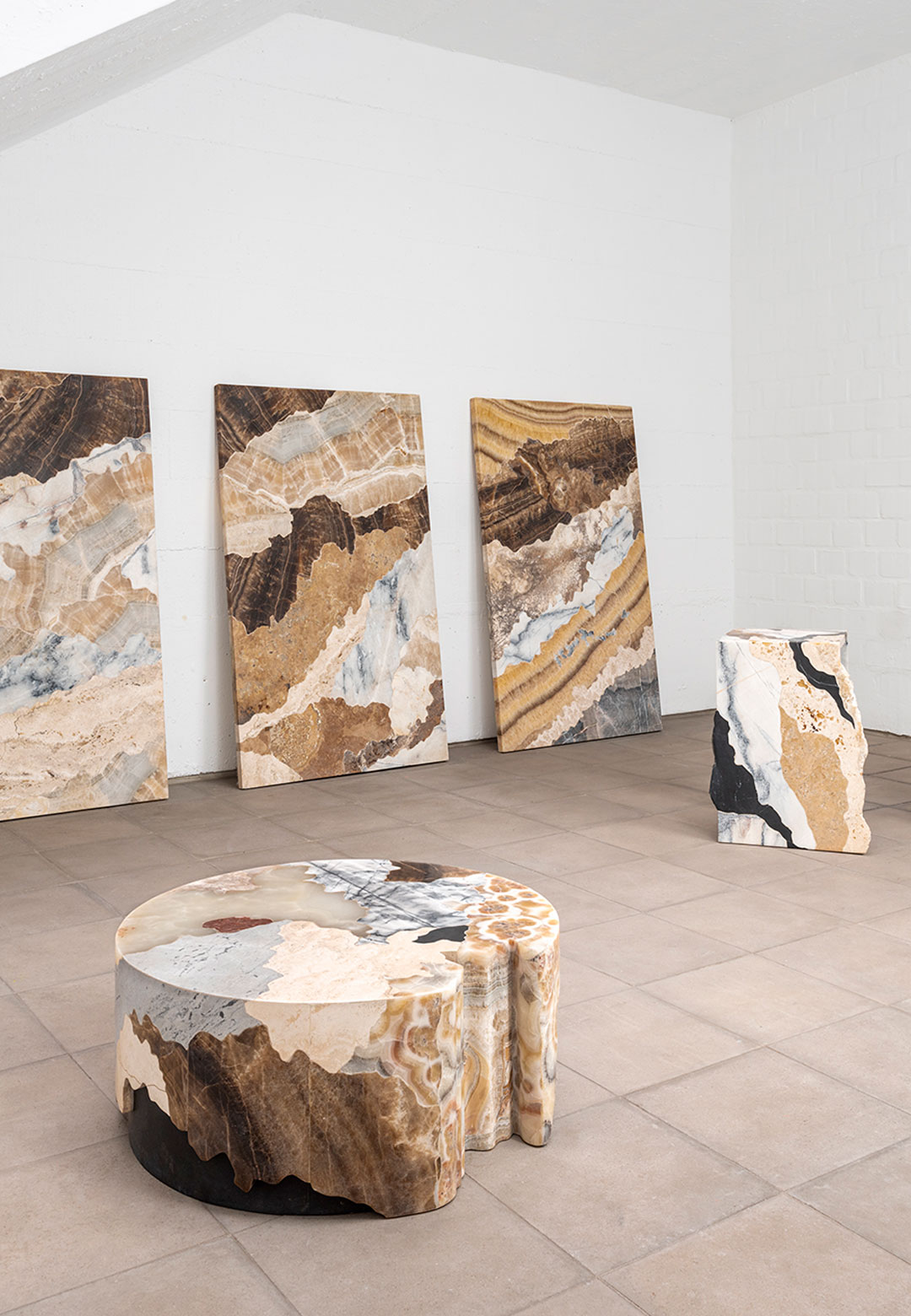In the highlands of Peru, where the Andes cradle centuries of history, stone has always held a central place in human expression: from ancient temples to modern craftsmanship. The story of Mapa de Suelos (Soil Map), a collection of stone tables conceived by RF Studio, begins in these layered landscapes, where geology and culture intertwine.
RF Studio, a Lima-based art and architecture practice, has created this furniture series interpreting the natural terrain of Peru. Drawing inspiration from aerial views and geological studies, the collection of table designs presents a striking vision of the land's complexity. Each piece is a reflection of the country's rich lithic traditions, meticulously handcrafted by Roberto Román, a master stone mason whose family has worked with rock for three generations. His workshop, nestled in the Huaycán district near the granite quarries east of Lima, serves as the creative heart of this collaboration.
The process of creating a single table can take months. Peruvian stones such as marble, travertine and various types of onyx, as well as small stone fragments often discarded by large industries, are painstakingly joined into intricate patterns for the pieces. This technique not only reclaims material that would otherwise go to waste but also embodies the precision and persistence required to honour Peru's culture.
The latest and most ambitious piece in the Mapa de Suelos collection, Table N°7, was commissioned by the Central restaurant in Lima, led by acclaimed chef Virgilio Martínez. Known for exploring the relationship between taste and altitude, Martínez's culinary philosophy aligns with the studio's engagement with material and geography. The table, measuring 290 x 100 x 76 cm, does more than provide a surface—it transforms the dining space into an immersive narrative. Together, the studio and restaurant blur boundaries between design, gastronomy and the experience of territory.
Mapa de Suelos bridges two perspectives of the Peruvian landscape: the aerial and the subterranean. From above, the Andes and Amazon appear as textured mosaics of valleys, rivers and ridges. Below, geological strata reveal layers of history compressed over millennia. By merging these views, the designers create what could be seen as a sculptural jigsaw; a harmonious dialogue between horizontal and vertical interpretations of the land.
Furthermore, this series is also deeply rooted in a sense of continuity. RF Studio's founder Rafael Freyre has spent the last decade experimenting with contemporary interiors and furniture designs that draw on Peru's lithic traditions. His designs pay homage to pre-Columbian civilisations and their profound connection to the environment. For Freyre, stone is not merely a material but a vessel of history, carrying the stories of those who shaped it.
Integral to the series is the collaboration with artisans who practice traditional stone-cutting techniques. In Peru, where technology often falls short of enabling large-scale stone extraction, much of the work still relies on human skill. Artisans carefully cut small pieces by hand from hillsides at various altitudes. Observing these methods, the Peruvian studio identified an opportunity to innovate while preserving heritage by joining fragments into cohesive forms while celebrating its artisanal roots.
Stone carries a tactile memory, not only of the earth's process but also of human hands that shape it. In this Soil Map collection, each table invites users to trace its surfaces, feeling the smooth polish of travertine against the rugged grain of granite. This experience bridges the gap between the materials' origins and their transformation, creating a sensory connection to the country's geology.
The use of fragments also symbolises a deeper cultural practice of reviving and reassembling what is broken. This philosophy mirrors the Andean concept of ayni, a reciprocal relationship of care and balance. By reconstructing these organically, RF Studio aligns with the ancient principle, blending innovation with modern design.
One of the standout elements of this project is its commitment to sustainability. By sourcing stone fragments considered waste by larger industries, the studio minimises environmental impact while breathing new life into discarded materials. This approach speaks to a larger ethos of respecting natural resources and finding beauty in imperfection through design.
The craft itself demands extraordinary attention to detail. Each piece in Mapa de Suelos is one of a kind, reflecting the variations in colour, texture and pattern inherent to the stone. They transcend their utility to become an extension of their cultural identity. The tables echo the intricacy of the local weaving traditions, where patterns are deeply tied to the land and community. This interplay of design and heritage allows the collection to function as both an artistic statement and a reflection of the nation's diverse natural landscapes.
The human element in the series is as vital as the stone itself. Each artisan contributes their expertise and interpretation, ensuring no two tables are alike. This individuality mirrors the artisanal approach to architecture in pre-Columbian societies, where builders tailored each structure to its environment. By embracing imperfection, Mapa de Suelos underscores the authenticity of handicraft.
RF Studio's work has earned recognition across the globe, with pieces exhibited at venues such as the Sydney Biennale, Zona Maco and the Malba Museum. In addition to Mapa de Suelos, the studio has collaborated on notable projects, including ecological boutique hotels and award-winning residential designs such as the House in Azpitia. Their dedication to integrating biodiversity, cultural practices and local materials into their designs reflects a holistic approach to contemporary design.
At its core, Mapa de Suelos is a tribute to Peru's layered landscapes and the enduring relationship between its people and the land. Each table is more than an object—it is a microcosm of history, geography and craftsmanship—a tangible connection to the complex beauty of the Andean and Amazonian terrain. Through these product designs, RF Studio offers not just tables but a way of experiencing the world: through the lens of unity in diversity and respect for the natural environment.






 Sign in with email
Sign in with email










What do you think?